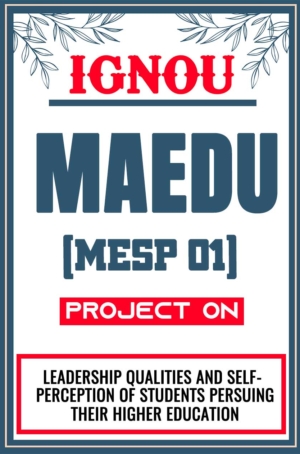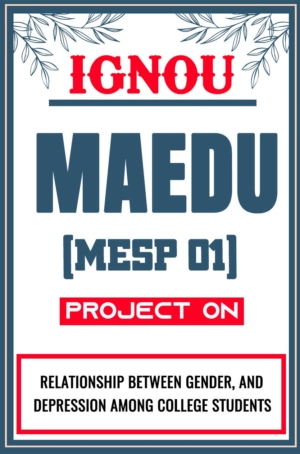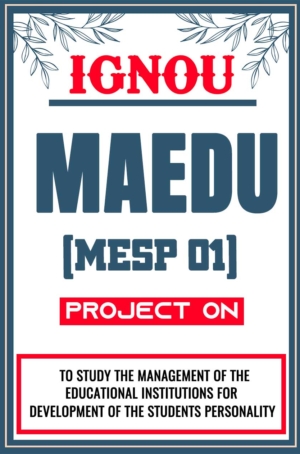Buy IGNOU MAEDU Project for MESP 1
IGNOU MAEDU Project would provide learners a wider and more comprehensive understanding of education as field of knowledge and would accommodate a wide variety of learning needs of learners.
Master of Arts (Education) is aimed at developing professionals for effective participation in educational actions in different areas of education. The IGNOU MAEDU Project for MESP 1 is an innovative Post-Graduate programme in education, which emphasises both disciplinary and professional dimensions of education as an area of study. The target group is a Graduate with or without a degree in education.
The Programme comprises six compulsory courses, one specialised area to be opted out of five specialized areas e.g. higher education, educational technologies, educational management, distance education and adult education. Apart from the theoretical courses, a student is required to submit a research report in the form of a dissertation.
Whatsapp us to get the Personalized (Customized) IGNOU MAEDU Project Dissertation and Synopsis
Download Link for IGNOU MAEDU Project (MESP 1)
What are the formatting requirements for the IGNOU MAEDU Project report?
To ensure your project report meets IGNOU’s standards, adhere to the following formatting requirements:
General Formatting
1. Font
- Use Times New Roman, 12-point font for the main text.
- For headings and subheadings, you may use a slightly larger font (14-point for main headings, 12-point bold for subheadings).
2. Spacing
- The main text should be double-spaced.
- Single-spacing can be used for long quotations, footnotes, and references.
3. Margins
- Use 1-inch margins on all sides (top, bottom, left, and right).
4. Alignment
- The text should be left-aligned.
- Ensure that the right margin is not justified (i.e., do not use full justification).
5. Paragraphs
- Indent the first line of each paragraph by 0.5 inches.
- Leave a blank line between paragraphs.
Title Page
- Title of the Project
- Name of the Student
- Enrollment Number
- Program Code and Title (MAEDU – Master of Arts in Education)
- Study Centre Code
- Supervisor’s Name
- Month and Year of Submission
Sections of the Report
- Title Page: As described above.
- Certificate of Originality: Signed by the student and supervisor.
- Acknowledgments: Optional, but a section to thank those who helped in the completion of the project.
- Table of Contents: List all sections and sub-sections with corresponding page numbers.
- List of Tables and Figures: If applicable, list all tables and figures with page numbers.
- Abstract: A concise summary of the project, usually not exceeding 300 words.
- Main Body of the Report:
- Introduction: Background, rationale, objectives, and research questions/hypotheses.
- Review of Literature: Summary and critique of existing research.
- Research Methodology: Detailed description of research design, sample, data collection tools, and procedures.
- Data Analysis and Interpretation: Presentation and analysis of data collected.
- Results and Discussion: Key findings and their implications.
- Conclusion and Recommendations: Summary of findings and suggestions for future research or practice.
- References: List all sources cited in the project, following the APA (American Psychological Association) style unless otherwise specified.
- Appendices: Any additional material such as questionnaires, interview guides, raw data, etc.
Binding and Submission
- Binding: The final report should be hardbound. The cover page should include the project title, student’s name, enrollment number, program code and title, Study Centre code, supervisor’s name, and the month and year of submission.
- Submission: Submit the bound copy to your Study Centre by the specified deadline. Keep an extra copy for your records and be prepared to submit an electronic copy if required.
Pagination
- Preliminary Pages: Use Roman numerals (i, ii, iii, etc.) for the abstract, acknowledgments, table of contents, and list of tables/figures.
- Main Body: Use Arabic numerals (1, 2, 3, etc.) starting from the introduction section.
IGNOU MAEDU Project Topics for MESP 1
- Leadership Qualities And Self-Perception Of Students Pursuing Their Higher Education
- A Study On Scholastic Backwardness In Children
- Relationship Between Gender, And Depression Among College Students
- A Study Of The Academic Achievement And Social Intelligence Of Students At University
- A Study On Locus Of Control And Academic Achievement Of Graduate Students
- Attitude And Leadership Qualities Of Delhi University Students
When is the IGNOU MAEDU Project report due?
The due date for the submission of the project report for the IGNOU MAEDU Programme typically follows the academic calendar set by IGNOU. However, the exact deadlines can vary depending on the session in which you are enrolled. Here are some general guidelines to help you determine the due date:
June Session
- Project Proposal Submission: By November 30th.
- Final Project Report Submission: By May 31st of the following year.
December Session
- Project Proposal Submission: By May 31st.
- Final Project Report Submission: By November 30th of the same year.
Checking Specific Deadlines
- Study Centre Notifications: Your Study Centre will provide specific deadlines for both the proposal and final report submissions. It is essential to stay in touch with your Study Centre and supervisor for any updates or changes.
- IGNOU Announcements: Regularly check the official IGNOU website and the Student Zone for announcements related to project submissions and other important dates.
- Contacting Your Supervisor: Your supervisor can provide detailed information about the deadlines and any extensions if needed.
What should you do if your data collection is incomplete by the submission deadline for your IGNOU MAEDU Project?
If your data collection is incomplete by the submission deadline for your MAEDU Project, here are the steps you should take:
1. Communicate with Your Supervisor
- Inform your supervisor immediately about the situation.
- Provide a clear explanation of why the data collection is incomplete and the challenges you faced.
2. Request an Extension
- Discuss the possibility of obtaining an extension with your supervisor.
- Provide a revised timeline and plan for completing the data collection.
- Submit a formal extension request to your Study Centre, if required. Include a detailed justification and a new proposed submission date.
3. Consider Alternative Data Collection Methods
- If an extension is not possible, explore alternative methods to gather the necessary data within the available time.
- Consider using secondary data, online surveys, or other accessible resources.
4. Adjust the Scope of Your Project
- If completing the full data collection is not feasible, discuss with your supervisor the possibility of narrowing the scope of your project.
- Focus on a smaller sample size or a specific aspect of your research question that can be completed with the available data.
5. Document Challenges and Adjustments
- Keep a detailed record of the challenges faced during data collection and any adjustments made to your research plan.
- Include this information in your project report to provide context for your findings and limitations.
6. Complete Data Analysis and Report Writing
- Proceed with analyzing the data you have collected so far.
- Write your project report, ensuring you clearly discuss the limitations due to incomplete data collection.
7. Highlight Recommendations for Future Research
- In your conclusion, suggest areas for future research that can address the gaps left by incomplete data collection.
- Provide recommendations for further studies to validate and expand upon your findings.
How do you ensure your conclusions are well-supported in your IGNOU MAEDU Project?
Ensuring that your conclusions are well-supported in your IGNOU MAEDU Project involves a systematic approach to research, data analysis, and interpretation. Here are some strategies to help you achieve this:
1. Strong Research Design
- Clear Objectives: Start with well-defined research objectives and questions. Ensure your study is designed to address these specific goals.
- Appropriate Methodology: Choose the correct research methodology (qualitative, quantitative, or mixed methods) that aligns with your research questions.
2. Comprehensive Literature Review
- Contextual Understanding: Conduct a thorough literature review to understand the existing body of knowledge related to your topic. This helps in framing your study and understanding the gaps your research aims to fill.
- Theoretical Framework: Use established theories and models to guide your research and provide a basis for your analysis and conclusions.
3. Rigorous Data Collection and Analysis
- Accurate Data Collection: Ensure data collection methods are appropriate, reliable, and valid. Follow ethical guidelines and obtain informed consent from participants.
- Detailed Data Analysis: Use suitable statistical or qualitative analysis techniques to analyze your data. Ensure your analysis is thorough and aligns with your research questions.
4. Logical Structure and Clear Presentation
- Organized Findings: Present your findings logically and clearly, using tables, graphs, and charts where appropriate.
- Consistent Narrative: Ensure there is a clear narrative connecting your research questions, methodology, findings, and conclusions.
5. Evidence-Based Conclusions
- Direct Link to Data: Ensure each conclusion is directly supported by the data presented in your findings. Avoid making assertions that are not backed by evidence.
- Address Research Questions: Your conclusions should answer the research questions posed at the beginning of your study.
6. Consideration of Limitations
- Acknowledge Limitations: Discuss any limitations of your study and how they might affect the generalizability or validity of your conclusions.
- Mitigation Strategies: Explain how you have mitigated these limitations and the impact they have on your findings.
7. Critical Discussion
- Compare with Existing Literature: Compare your findings with existing studies to highlight similarities, differences, and new insights your research provides.
- Implications: Discuss the implications of your findings for theory, practice, and future research.
8. Feedback and Review
- Seek Feedback: Obtain feedback from your supervisor and peers to identify any gaps or weaknesses in your conclusions.
- Revise and Refine: Revise your conclusions based on the feedback received to ensure they are robust and well-supported.
Can you appeal if you are not satisfied with your IGNOU MAEDU Project evaluation?
Yes, if you are not satisfied with the evaluation of your project for the IGNOU MAEDU Project (MESP 1), you have the option to appeal the evaluation decision. Here’s a guide on how to proceed:
Steps to Appeal Project Evaluation
Review the Evaluation Report
- Carefully review the feedback and comments provided by the evaluator.
- Identify specific areas of disagreement or issues that you believe were not addressed correctly.
Prepare a Detailed Appeal
- Write a Formal Appeal Letter: Draft a formal appeal letter addressing the specific concerns with the evaluation. Be clear and objective in your points.
- Provide Supporting Evidence: Include any additional documentation or evidence that supports your case, such as revised sections of your project or clarifications on misunderstood aspects.
Submit the Appeal
- Contact Your Study Centre: Submit your appeal to your Study Centre or the relevant department. They will guide you on the formal procedure for lodging an appeal.
- Follow the Procedure: Ensure you follow the prescribed format and procedure for submitting the appeal as per IGNOU’s guidelines.
Include a Detailed Justification
- Explain why you believe the evaluation was unfair or incorrect.
- Address specific comments or scores and provide a well-reasoned justification for why the evaluation should be reconsidered.
Seek Feedback
- Consult Your Supervisor: Discuss the feedback and your intended appeal with your project supervisor. They may offer valuable insights or additional support.
- Get Advice: Seek advice from your Study Centre on how to strengthen your appeal.
Review IGNOU’s Appeal Policy
- Understand the Guidelines: Familiarize yourself with IGNOU’s policies and procedures for handling appeals. This information can often be found on the IGNOU website or in the student handbook.
- Follow Deadlines: Be aware of any deadlines for submitting an appeal to ensure that your request is considered in a timely manner.
How do you present qualitative data in your IGNOU MAEDU Project report?
Presenting qualitative data effectively in your report for the IGNOU MAEDU Project (MESP 1) involves organizing, analyzing, and interpreting the data in a way that clearly communicates your findings and insights. Here are some strategies and tips for presenting qualitative data:
1. Organize Your Qualitative Data
- Categorize Themes: Identify and categorize key themes or patterns that emerged from your data. Use coding to group similar responses or concepts.
- Create Categories: Develop categories based on your research questions and objectives to help organize the data.
2. Present Data Using Various Formats
- Textual Descriptions: Provide detailed descriptions and narratives of the themes or patterns identified. Explain how these themes relate to your research questions.
- Quotes and Excerpts: Use direct quotes or excerpts from interviews, focus groups, or other qualitative sources to illustrate key points. Ensure that quotes are relevant and help support your findings.
- Example: “One participant noted, ‘The interactive activities greatly enhanced my engagement in the online course,’ which highlights the effectiveness of interactive methods.”
- Tables and Charts: Use tables or charts to summarize key themes or patterns. This can help in visualizing the frequency or distribution of themes.
- Example: A table might list themes and the number of occurrences or a chart showing the proportion of participants mentioning specific themes.
3. Analyze and Interpret Data
- Thematic Analysis: Discuss the themes or patterns identified in your data. Explain the significance of each theme and how it answers your research questions.
- Contextual Interpretation: Provide context for your findings by relating them to existing literature, theories, or frameworks. Explain how your findings fit within the broader research landscape.
4. Structure Your Presentation
- Introduction to Findings: Begin with an introduction that outlines the main themes or categories derived from the data.
- Detailed Analysis: Present each theme or category in detail, including supporting quotes or data excerpts. Organize this section by theme rather than by participant or source.
- Discussion of Implications: Discuss the implications of your findings for your research questions, theoretical framework, and practical applications.
5. Ensure Clarity and Cohesion
- Clear Presentation: Ensure that the presentation of qualitative data is clear and logically organized. Use subheadings and bullet points to enhance readability.
- Consistent Terminology: Use consistent terminology when referring to themes or categories to avoid confusion.
6. Ethical Considerations
- Anonymity and Confidentiality: Ensure that all quotes or excerpts are anonymized to protect participant confidentiality. Avoid including any identifying information.
- Consent: Confirm that you have obtained consent from participants to use their responses in your report.
Ready to get your IGNOU MAEDU Project Dissertation and Synopsis Sample PDF for MESP 1?
- Call us or WhatsApp us at: 9958947060, 9354637830
- Visit: SHRICHAKRADHAR.COM
-
Sale!

-
Sale!

IGNOU MAEDU Project (MESP 1) Synopsis/Proposal & Project Report/Dissertation in Hard-Copy (Sample-9)
Original price was: ₹499.00.₹249.00Current price is: ₹249.00. -
Sale!

IGNOU MAEDU Project (MESP 1) Synopsis/Proposal & Project Report/Dissertation in Hard-Copy (Sample-8)
Original price was: ₹499.00.₹249.00Current price is: ₹249.00. -
Sale!

IGNOU MAEDU Project (MESP 1) Synopsis/Proposal & Project Report/Dissertation in Hard-Copy (Sample-7)
Original price was: ₹499.00.₹249.00Current price is: ₹249.00. -
Sale!

IGNOU MAEDU Project (MESP 1) Synopsis/Proposal & Project Report/Dissertation in Hard-Copy (Sample-6)
Original price was: ₹499.00.₹249.00Current price is: ₹249.00. -
Sale!

IGNOU MAEDU Project (MESP 1) Synopsis/Proposal & Project Report/Dissertation in Hard-Copy (Sample-5)
Original price was: ₹499.00.₹249.00Current price is: ₹249.00. -
Sale!

IGNOU MAEDU Project (MESP 1) Synopsis/Proposal & Project Report/Dissertation in Hard-Copy (Sample-4)
Original price was: ₹499.00.₹249.00Current price is: ₹249.00. -
Sale!

IGNOU MAEDU Project (MESP 1) Synopsis/Proposal & Project Report/Dissertation in Hard-Copy (Sample-3)
Original price was: ₹499.00.₹249.00Current price is: ₹249.00. -
Sale!

IGNOU MAEDU Project (MESP 1) Synopsis/Proposal & Project Report/Dissertation in Hard-Copy (Sample-2)
Original price was: ₹499.00.₹249.00Current price is: ₹249.00. -
Sale!

IGNOU MAEDU Project (MESP 1) Synopsis/Proposal & Project Report/Dissertation in Hard-Copy (Sample-1)
Original price was: ₹499.00.₹249.00Current price is: ₹249.00.










